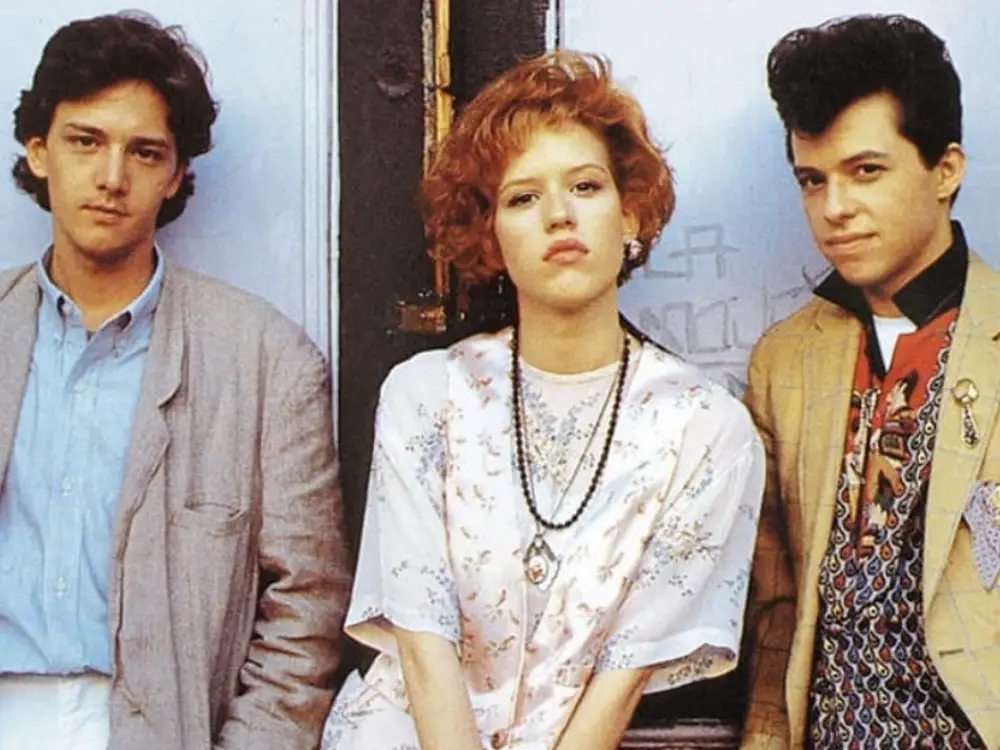It’s a familiar set up. The boy likes a girl. He is unpopular, nervous, and is in some way unconventional. The audience is told he is sweet and empathetic. To show how unassuming and down to earth he is, he has a crush on the most beautiful woman he knows and will stop at nothing to have her. Sound familiar? This is the plot of “Friends,” “The Big Bang Theory,” “When a Stranger Calls,” “You,” “500 Days of Summer” and others.
Urban Dictionary defines a “Nice Guy” as: “Not to be confused with a nice guy (that is, a male that is nice. The term “Nice Guy” refers to people (men or women) who believe basic social expectations are currency for sex.” This character first became recognizable in the 1930s with films like “Top Hat” and “The Gay Divorce.” Both of Fred Astaire’s characters follow the fair-haired woman of their dreams. But the romance takes a frightening turn when both Nice Guys begin chasing their love interest. This includes stalking her at an event, following her in a car chase and even opening the top of her cab and attempting to come in after her. Similar characters can be found in modern entertainment, and some characters are so grimy they stick with us.
Popular comedies like “Friends,” “The Big Bang Theory” and “How I Met Your Mother” are all examples of male characters who begin as underdogs, outcasts or nerds. Ross Geller is often cited as the Nice Guy of “Friends.” Ross begins the series losing his wife to another woman. He spends much of Season 1 wondering if his divorce was a door closing or another door opening. The show seems to say: “Look at how sad and nonthreatening he is.” But viewers learn an insecure man can still be toxic, if not more so. The open door comes in the form of Rachel Green, his high school crush. This crush brings out some of the worst in Ross. But Ross insists that not only does he not have feelings for Rachel, but he is not affected by her relationships despite instances where he is clearly jealous.
Denial is a common trait found in the “Nice Guy” and it not only harms the woman he loves, but it entraps him in a relationship he will never approach. The media likes to dangle romance in front of the audience’s face, teasing a potential couple. But the Nice Guy can stop any relationship from developing on his own. The combination of idolizing his crush and his low self-esteem convinces him that she is a perfect woman and, because of this, he cannot work up the courage to pursue his true feelings. Take Duckie from “Pretty in Pink” for example.
Duckie Dale is a goofy kid who is constantly seeking attention from his best friend and crush, Andie. But she has feelings for another boy in her class, Blane. Duckie believes he is the only one truly worthy of Andie’s affection. Like most Nice Guys, Duckie tells himself he is acting in Andie’s best interests. But he ignores her right to choose and begrudges any other man who likes her. When Duckie finds out Andie is pursuing a relationship with Blane, he insults her.
“I can’t believe you’d be this stupid,” he says. Duckie ignores Andie’s desires in favor of his anger. Like a typical Nice Guy, he pretends that his anger is only out of love that he has for his crush. His actions are justifiable because he is the only one who knows what is best for her. He doesn’t see himself as controlling. This can be seen in Andie and Duckie’s everyday interactions. He tells her that he wants to take her away for the weekend, and says, “I won’t take no for an answer.” Andie frowns and says, “Try” before walking away. His beliefs leave no room for her opinions in their friendship, let alone a relationship. Still, Duckie insists he is better for her than Blane. “He’s gonna use your ass and throw you away,” Duckie says. “God, I would have died for you!”
Another trait of the Nice Guy is his skittish approach to his goals and relationships. The Nice Guy often corners himself and lashes out at others for consequences that he brought onto himself. When he likes a woman but doesn’t act on it, he eventually grows resentful of his attraction to her, and even of the woman herself. This results in her being made to feel guilty or being harassed by the Nice Guy and his friends. For example, consider the 1994 drama “My So Called Life.”
One of the main characters, Brian, is in love with his childhood best friend, Angela. Brian is shy, he’s in band, he takes photos for the yearbook and he gets straight As. Yet, he can’t get the girl. When Angela begins spending more time with another guy, Jordan, he becomes jealous. Instead of confronting Angela or accepting the consequences due to not stating his feelings earlier, Brian starts a rumor about her and Jordan having sex in his car. This results in Angela being slut-shamed while he gets off scot-free.
The Nice Guy is also guilty of putting his crush on a pedestal. But when the woman acts against his image of her that he has created in his head, he isn’t so nice after all. Think of Ross’ distrust in Rachel when she begins a new job. Instead of celebrating her accomplishments and being happy for Rachel like a true nice guy, Ross is jealous and causes an uncomfortable scene at her work. These limitations can also be seen in movies, such as “500 Days of Summer.” Tom (Joseph Gordon-Levitt) tells his crush, Summer (Zooey Deschanel), that he looks down upon other women and their “giant sunglasses, tattoos, [and] handbags with little dogs inside it.” He tells her that he likes how she dresses. Summer then jokes, “I was thinking about getting a butterfly tattoo.” Tom frowns and quickly says, “No,” before he realizes it’s a joke and attempts to laugh it off.
https://www.youtube.com/watch?v=rei4MLLSQow
The Nice Guy often explodes when he finally acknowledges reality. “500 Days of Summer” was a direct commentary on this illusion, going as far as splitting the screen in half to show Tom’s expectations versus his reality. When he gives Summer a copy of his favorite book, he expects her to hug him. Instead, she smiles and thanks him. But Tom doesn’t want her thanks, he wants Summer to be his girlfriend. Reality quickly hits Tom like a ton of bricks when Summer says she likes him, but only wants to remain friends. “Well, you’re not the only one that gets a say in this,” Tom shouts. “I do too! And I say we’re a couple, goddamn it!”
A real couple is not one person insisting they deserve a relationship after meeting self-made requirements. These moments show the audience that the conditional love of a Nice Guy is based on how accepting a woman is of his advances. Think Season 3, Episode 8 of “Mad Men.” “I went to a lot of trouble to solve your dress problem, and I think I at least deserve to see it on you,” Pete Campbell tells a young girl.
The “non-threatening” Nice Guy is more obvious in the comedy “The Big Bang Theory.” The Pop Culture Detective thoroughly explores this show and what he calls “adorkable misogyny.” “It’s their status as nerdy nice guys that lets them off the hook for a wide range of creepy, entitled, and downright sexist behaviors,” he explains. One of the main characters, Leonard, spends much of the series insulting his crush’s intelligence. His crush, Penny, is spoken down to, spied on, lied to and manipulated by him. Though this is not the first example of nerds breaking laws and social conventions (think “Sixteen Candles” and “Revenge of the Nerds”), it is one of the most popular.
The Nice Guy’s behavior is normalized as his personality is not associated with hypermasculinity and he is written as a smarter, more sensitive alternative for the female character. The audiences are led to believe the persistence of the Nice Guy is admirable, and ultimately, what leads to him finding true love. Ted Mosby from “How I Met Your Mother” believes you should never stop chasing the woman of your dreams. “When you love someone you just, you … you don’t stop. Ever,” he says. “Even when people roll their eyes or call you crazy. Even then. Especially then.”
In 2018, the Nice Guy was placed under a more critical lens, which held him responsible for his actions. The antagonist of “Love, Simon” is Martin Addison, a high school senior known for his love of magic, musicals and the beautiful Abby Suso. The film shows us how far Martin is willing to go for his crush when he blackmails her friend Simon into making Abby like him. If Simon refuses, Martin will tell everyone that Simon is gay. Yet, Martin considers himself a nice, funny guy and even views himself as the underdog in this situation.
While blackmailing him, Martin says, “It’s not all about looks, Simon.” “So, you’re banking on your great, blackmaily personality to get the job done?” Simon responds. Martin then makes Abby uncomfortable when she, Simon and Martin go out for dinner. He asks her extremely personal questions and proceeds to stand up in the restaurant’s booth, shouting at the top of his lungs until she complies with his wishes. When Martin asks Abby to be his girlfriend and she politely turns him down, Martin becomes angry and tells everyone that Simon is gay anyways.
The Nice Guy’s refusal to recognize women’s autonomy affects everyone, and while he may think himself to be a gentleman or “not like the other guys,” he is really a wolf in sheep’s clothing. The darkest depiction of the Nice Guy in 2018 is Joe Goldberg in the Netflix show “You,” who idolizes his lover, Beck, as the perfect woman. He then murders those he thinks unworthy of her. Joe’s inability to trust her, accept rejection and recognize that he is the problem results in their breakup. Beck runs away from him in an attempt to report him to the police for stalking, breaking and entering, kidnapping and murder. But Joe doesn’t see himself as a threat. He sees himself as a nice guy, the perfect boyfriend. Joe also describes himself as “the only real feminist.” The Nice Guy in media is easy to point out, but how have the expectations of this character affected society?
Audiences are led to believe that the Nice Guy must end up with the woman he loves. Anything else would be a loss. To convince the woman to be with him, the Nice Guy is shown wearing her down, bullying her, manipulating her or even lying to her. Love stories featuring the Nice Guy reward toxic behavior. The idea that a man must simply wear a woman down after being rejected adds to rape culture. “No” becomes “convince me.”
It furthers the idea that women are not intelligent or mature enough to control their own autonomy, that they are overacting to predatory behavior and that the man truly know what’s best. So, when the Nice Guy spies on her with binoculars or helps her drunkenly stumble into his car, he’s not being creepy, he’s just being nice. This furthers rape culture and endangers women. These characters are also extremely disrespectful to men because it tells society that the Nice Guy is the best men have to offer, which is simply untrue. These characters, expressions and expectations are muddling the reality of what happens to truly nice men.
“Nice guys finish last” is a well-known saying and lie, which perpetuates the idea that what women want is a disrespectful, toxic man. What women truly want is someone who respects their feelings and decisions, even when that means rejection. Especially when that means rejection. Rejection hurts and there is nothing wrong with respectfully ending a female friendship that has become too painful. But that doesn’t mean she deserves to be bullied, have rumors spread about her, threatened, embarrassed or made to feel like she has done something wrong simply because a man is interested in her. When the Nice Guy mistreats his love interest for having her own feelings and desires, he loses whatever credibility he once had.
Truly nice guys never finish last because the traits that make up their personalities ensure they have other strong relationships. This isn’t to say romantic love isn’t important, but it shouldn’t define a person and it doesn’t justify cruel behavior. The reaction to rejection is a large part of what makes up a Nice Guy. He tells himself he’s been patient, he’s been understanding, he’s been there for her so many times, so why doesn’t she love him back? But she does love him, just not the way he loves her, and that’s okay. And a nice guy will understand that.
Duckie begins as a classic example of the Nice Guy, but his final reaction to rejection is part of what makes him a genuinely nice person. Duckie accepts that Andie has feelings for Blane. He tells her she was right, that Blane is different. He doesn’t talk down to her and does not insist that she owes him anything. He shakes Blane’s hand and encourages Andie to do what she wants instead of begrudging her desires. The movie originally ended with Duckie wearing Andie down and the two dating, but test audiences hated it. Because the truth is women want the reality of dating a nice guy, not the anger and conditional love of a Nice Guy. Fortunately, several modern films and shows have also defined what a true nice guy really looks like.
The true nice guy doesn’t resent his girlfriend for being independent. He’s proud of her accomplishments and encourages her aspirations. Ben Wyatt from “Parks and Recreation” and Jason Mendoza and Chidi Anagonye from “The Good Place” are all great examples of good, loving men. They support their partner’s goals, they encourage her and they don’t monitor her success in fear of being outdone or injuring their masculinity. “I love how independent my wife is,” says Ben Wyatt. The true nice guy appreciates the woman for who she is. Love interest Peter Kavinsky, from “To All The Boys I’ve Loved Before,” takes the time to get to know Lara Jean’s interests, her past and even her favorite snacks. He listens to her and respects her decisions. He doesn’t rush her into something she doesn’t want. Because of his honesty, kindness and ability to empathize with Lara Jean, she tells him, “You’re a good listener.”
The final example of the real nice guy is George Bailey of “It’s A Wonderful Life. ”He gives to others and expects nothing in return. He marries a beautiful woman and he doesn’t spend their marriage justifying his own insecurities as he forbids his wife from having goals. The reason George’s life is so wonderful is because he loves without limit and that love comes back to him when he needs it the most. The real nice guy doesn’t demand compensation for treating someone decently.
Love without condition is where the truly nice people shine, and for them being nice doesn’t mean finishing last. It means recognizing women are more than lines to cross, that they are real people with their own desires and emotions. The truly nice guy loves a woman not in spite of her ambition, but because of it.
















